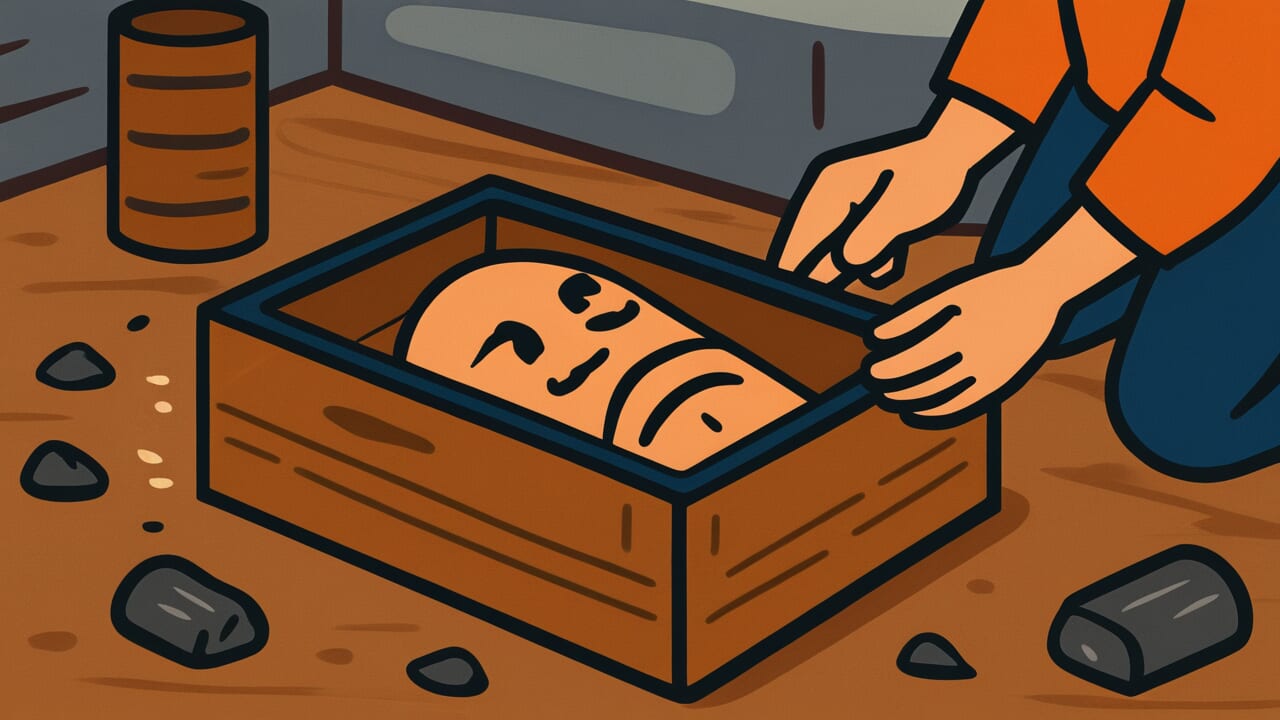How to Read “Putting gunpowder in a tinderbox and taking a nap”
Hiuchi-bako ni ensho irete hirune suru
Meaning of “Putting gunpowder in a tinderbox and taking a nap”
This proverb describes being in an extremely dangerous situation while remaining unaware or defenseless. It expresses the foolishness of sleeping peacefully when an explosion could happen at any moment.
People use this saying to criticize those who fail to manage risks properly. It applies to business leaders who ignore serious problems, students who play around right before exams, or people who refuse to change unhealthy habits despite warning signs.
This expression works better than simply saying “that’s dangerous.” The concrete image of gunpowder and sparks powerfully conveys both the urgent danger and the person’s complete lack of awareness.
Even today, this proverb effectively points out overly optimistic attitudes toward immediate crises. It teaches us how foolish and frightening it is to combine danger with carelessness.
Origin and Etymology
No clear written records document the origin of this proverb. However, examining its components reveals interesting insights.
A tinderbox was a fire-starting tool widely used until the Edo period. People struck flint against steel to create sparks that would ignite tinder. Every household owned this essential daily tool.
Gunpowder refers to saltpeter, the main ingredient in explosives. Made primarily of potassium nitrate, it becomes black powder when mixed with charcoal and sulfur. During the Edo period, people used it for guns and fireworks. Handling it required extreme caution.
This proverb layers three levels of danger together. It places gunpowder next to a spark-making device, then adds the defenselessness of sleep. Using a tinderbox always scatters sparks everywhere.
With gunpowder nearby, an explosion could happen instantly. Yet sleeping carelessly in this situation is truly suicidal behavior.
This expression likely emerged from the real experiences of people who lived with gunpowder nearby. Their strong vigilance about handling dangerous materials probably created this memorable saying.
Interesting Facts
Tinderboxes were essential items during the Edo period. People continued using them until the mid-Meiji era when matches became widespread. Creating sparks with flint required real skill.
Inexperienced people had to strike repeatedly before getting fire. Because of this difficulty, households carefully preserved fire sources. At night, people buried charcoal in ash to keep embers alive until morning.
Gunpowder was precious from the Warring States period through the Edo period. Japan had no natural sources, so imports were initially necessary. Later, the Edo period saw the development of “old soil method.”
This technique extracted nitrate salts from soil under old houses. The Gokayama region of Kaga Domain secretly produced gunpowder, making it an important revenue source.
Usage Examples
- That company’s president going on overseas vacation while accounting fraud is exposed is like putting gunpowder in a tinderbox and taking a nap
- Continuing to gamble while your debt grows is like putting gunpowder in a tinderbox and taking a nap
Universal Wisdom
This proverb teaches us about “normalcy bias,” a psychological weakness all humans share. Even when danger is right in front of us, we tend to think “it’ll be fine” or “I’ll be okay.”
Why can people nap in the face of danger? Because until crisis becomes reality, humans have a strong desire to stay in their comfortable daily routine.
Recognizing danger means facing anxiety and making efforts to change behavior. This is mentally exhausting, and honestly, we’d rather avoid it.
Our ancestors understood this human weakness. That’s why they used the extreme example of gunpowder and sparks to warn us. They wanted to convey the message “even though things seem peaceful now, danger is definitely there.”
The fact that this proverb has been passed down for so long proves that humans have repeated the same mistakes many times. Throughout history, countless people and organizations have been destroyed by underestimating crises.
Yet people still want to remain optimistic. This contradiction is part of being human. That’s exactly why we need to constantly remember this lesson.
When AI Hears This
Viewing this proverb through complexity science reveals surprising insights. Normal accident theory explains that when “complexity” and “tight coupling” combine, accidents become unavoidable.
The tinderbox and gunpowder combination perfectly meets these conditions. A tinderbox creates sparks, gunpowder is explosive material. Each alone is manageable, but placing them together creates “tight coupling.”
This means small changes in one immediately affect the other. Adding “napping” removes the monitoring function and increases system complexity. Unpredictable variables like rolling over, earthquakes, temperature changes, and humidity all start acting simultaneously.
Perrow’s research analyzed cases like Three Mile Island and the Challenger explosion. Individual elements stayed within normal ranges, yet their unexpected combinations caused catastrophe.
What makes this proverb truly frightening isn’t the simple cause-and-effect of “if there’s a fire.” It’s that “when and through which path the accident occurs is unpredictable.” Sparks might fly directly, or static electricity might ignite it, or the container might break.
Too many pathways exist to prevent them all. This structure applies to modern cybersecurity and AI system safety as well.
Lessons for Today
This proverb teaches you not to let your guard down just because “things are peaceful now.” Life contains hidden dangers. Health, relationships, work, money—any of these can reach an irreversible state while you’re thinking “still okay.”
What matters is developing a habit of regularly examining your situation objectively. Is your debt growing? Are your health checkup numbers getting worse? Are relationships with important people becoming distant?
Not missing small warning signs is the first step to preventing major disasters.
When you notice danger, act immediately. Saying “I’ll do it later” or “let me watch a bit longer” is exactly like napping next to a tinderbox. Facing anxiety takes courage, but that courage protects you.
What our ancestors wanted to convey through this powerful expression was their wish for you to value your life. Seeds of future crisis hide within peaceful daily life.
Wake up and start with what you can do today.



Comments